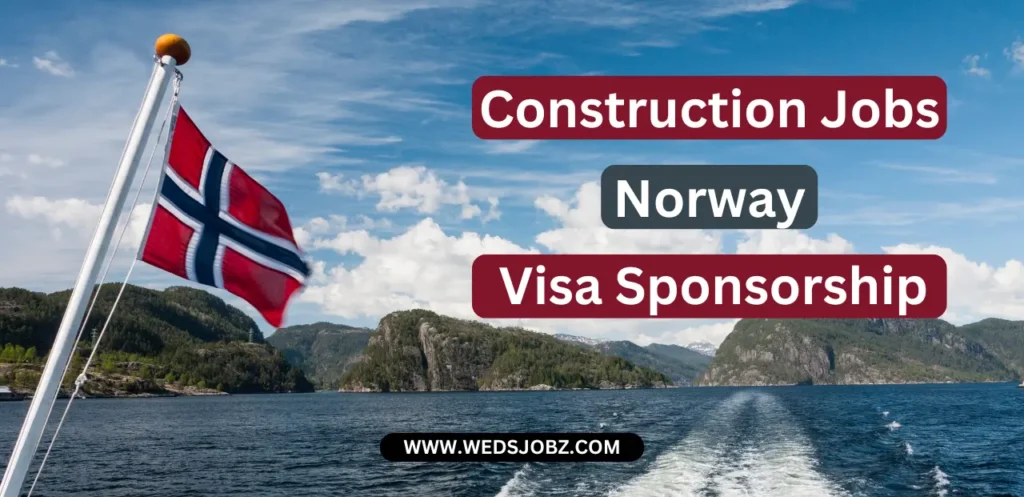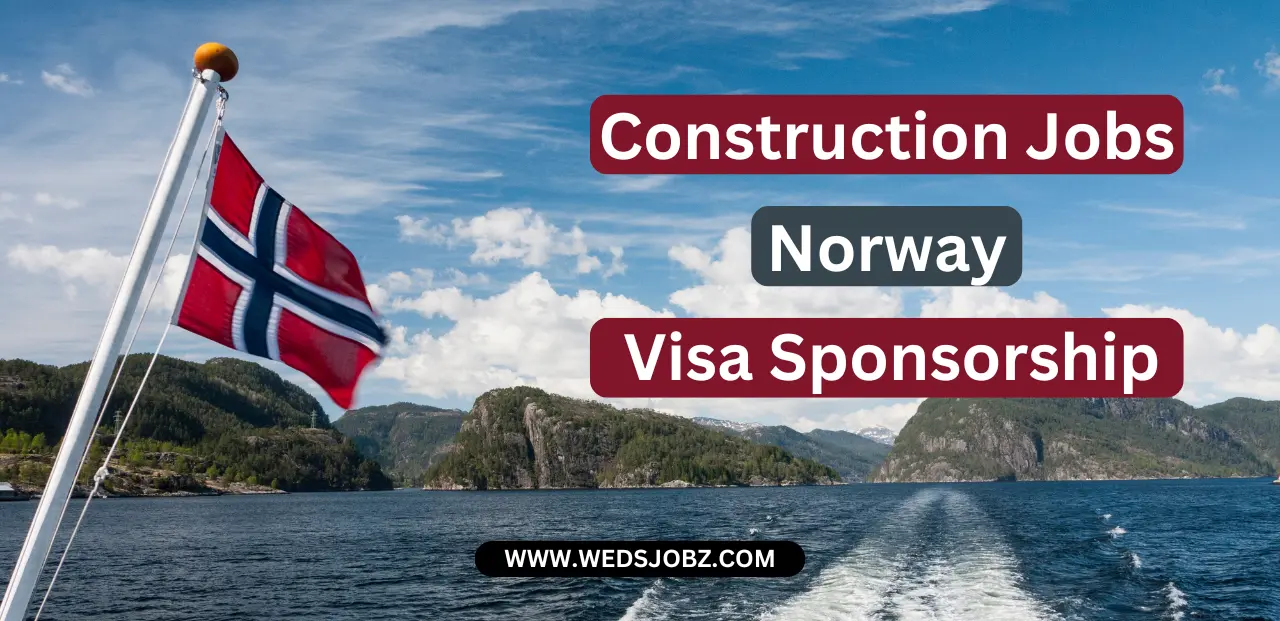Norway is a prosperous country in Europe, known for its high living standards and strong economy. It’s an ideal place for those seeking job opportunities, including in the construction industry.
The country has a steady demand for workers, excellent healthcare, and a variety of social benefits. If you’re interested in construction jobs in Norway, this guide provides all the important details you need to know, including job requirements, responsibilities, benefits, and how to apply.
Also Apply: 1 Year Job Seeker Visa for Spain in 2025

Construction Jobs in Norway
Here’s the job information in a simple table:
| Job Type | Construction |
|---|---|
| Education Required | None (High school diploma can be helpful) |
| Experience | 1-2 years |
| Visa Sponsorship | Available |
Requirements for Construction Jobs in Norway
To work in construction in Norway, there are some basic requirements you’ll need to meet. These include education, experience, skills, and possibly licenses or training, depending on the type of work.
1. Education Requirements
You don’t need specific educational qualifications for most construction jobs in Norway, though a high school diploma or equivalent can be useful. Some roles, like those in project management or engineering, may require higher education, but for general labor or trades roles, no formal qualifications are necessary.
2. Experience
Having 1-2 years of experience in construction work is typically required. Experience in the field ensures you are familiar with the tools, techniques, and safety protocols needed on a construction site. If you don’t have direct experience, apprenticeships or hands-on learning can also help you qualify for a job.
3. Licenses and Training
For certain construction roles, you may need specific licenses or safety certifications, especially if you’ll be using heavy machinery or working with hazardous materials. Many employers in Norway offer training, so even if you don’t have these certifications beforehand, they may provide the necessary instruction once you’re hired.
4. Skills Needed
Some of the key skills for construction jobs include:
- Tool Proficiency: Knowing how to safely use construction tools like drills, hammers, and pneumatic tools.
- Material Knowledge: Familiarity with construction materials like concrete, sand, grout, and other building materials.
- Blueprint Reading: Understanding and following instructions or blueprints is often required.
- Building Methods: Knowledge of construction processes, such as pouring concrete, framing, and installing fixtures, is important.
5. Physical and Personal Attributes
Construction work is physically demanding, so workers need to be in good physical health. Some important personal qualities include:
- Physical Fitness: You may need to lift heavy materials, stand for long periods, or perform strenuous tasks.
- Coordination: Good hand-eye coordination is necessary when using tools and working with machinery.
- Teamwork: Most construction projects require working with other people, so being able to cooperate and communicate effectively is essential.
6. Communication Skills
Although knowing Norwegian is a plus, most construction jobs in Norway require workers to speak and understand English, as many construction companies operate in English. Good communication skills ensure that you can follow instructions, ask questions, and understand safety protocols.

Responsibilities of Construction Workers in Norway
Construction workers have a variety of tasks depending on the job role. These tasks can range from basic labor to more specialized work. Here are some of the main responsibilities for construction workers in Norway:
- Assisting Skilled Workers: Many construction workers start by assisting skilled tradespeople, like electricians, carpenters, and machine operators. In this role, you’ll perform basic tasks such as fetching tools, organizing materials, or helping with more technical aspects of the job.
- Building and Dismantling Structures: Construction workers are often responsible for setting up and taking down temporary structures, like scaffolding or platforms. These tasks require good knowledge of safety procedures to ensure that structures are erected and dismantled without risk to workers.
- Material Handling: Moving materials around a construction site is another key responsibility. This can include unloading materials like concrete, bricks, and sand, and organizing them for easy access during construction.
- Demolition: Some construction jobs involve demolishing old buildings or parts of buildings. This work requires careful planning and safety precautions, especially when handling potentially hazardous materials or using explosives.
- Concrete Work: A common task in construction is working with concrete. Workers mix, pour, and level concrete for foundations, floors, and other structures. It’s essential to get the mix right and ensure the surface is smooth and even.
- Site Clean-Up: After construction work, the site must be cleaned up. This involves removing debris, garbage, and any hazardous materials, and ensuring the site is safe and ready for the next phase of work or for final inspection.
- Traffic Management: Construction workers may be responsible for setting up traffic signs and barriers to manage the flow of traffic around the construction site. This ensures that both vehicles and pedestrians can safely navigate the area.
- Safety Compliance: Safety is a top priority on construction sites in Norway. Workers are required to follow strict safety rules, including wearing protective gear such as helmets, gloves, and boots, and adhering to safety protocols to prevent accidents.
More Details: Australia Jobs
Benefits of Construction Jobs in Norway with Visa Sponsorship
There are many benefits to working in construction in Norway, especially if you’re coming from another country. Here are some key advantages:
Visa Sponsorship
Norway provides visa sponsorship for foreign workers. This means you can legally work in Norway, even if you don’t speak Norwegian as your first language or don’t have the required qualifications. Visa sponsorship makes it easier to get work permits and start a job in Norway.
Stable Economy
Norway has a strong and stable economy with low unemployment rates. This provides job security, and construction jobs are in high demand, so it’s a good time to look for work in the sector.
Fair Pay and Workers’ Rights
Norway has strong labor laws that ensure workers are paid fairly and treated well. Even for low-skilled jobs, you’ll receive fair compensation and protection. The country’s labor laws also ensure that workers receive benefits like paid leave, health insurance, and pensions.
Social Benefits
In addition to fair pay, workers in Norway receive excellent social benefits. This includes healthcare coverage, parental leave, and retirement pensions. These benefits contribute to a high quality of life for workers and their families.
Training and Career Growth
Many companies in Norway offer training programs to help workers improve their skills and advance in their careers. This can lead to better job opportunities, higher wages, and the chance to move into more specialized roles.
Safety and Health Standards
Construction companies in Norway follow strict safety regulations. Workers are trained to reduce the risk of accidents, and employers provide the necessary protective equipment. The emphasis on safety ensures a healthier and safer work environment.
High Quality of Life
Norway regularly ranks high in terms of quality of life. The country offers excellent healthcare, education, public services, and natural beauty, making it a pleasant place to live and work.
Multicultural Society
Norway is home to people from many different countries. Working in Norway gives you the opportunity to interact with people from diverse backgrounds, learn new languages, and expand your cultural understanding.
Path to Permanent Residency
If you work in Norway for a certain period, you may be eligible to apply for permanent residency. This allows you to stay in the country long-term and enjoy the benefits of permanent residency.
Salary in Construction Jobs in Norway
Salaries for construction workers in Norway vary depending on the role and experience. For example:
| Job Title | Hourly Rate | Annual Salary |
|---|---|---|
| Development Laborer | NOK 270 | NOK 560,836 |
| Development Specialist | N/A | NOK 410,532 – NOK 668,517 |
How to Apply for Construction Jobs in Norway
To apply for a construction job in Norway, look for job listings on Norwegian recruitment websites or contact agencies that specialize in construction roles. Make sure your resume includes relevant experience and any certifications or licenses. If you’re applying for a visa, check with the Norwegian Directorate of Immigration (UDI) for the necessary steps.
Conclusion
Construction jobs in Norway offer a great opportunity for foreign workers. With visa sponsorship, good pay, and a high standard of living, Norway is an excellent place to build a career in construction.
The country’s stable economy, strong worker protections, and focus on safety make it an ideal destination for anyone looking for steady work and career growth. Whether you’re starting your career or have years of experience, construction jobs in Norway provide ample opportunities to succeed.
Also Apply: Top Netherlands Companies Hiring Foreigners Oct 2024
FAQs
What qualifications are needed?
No formal qualifications are required, but a high school diploma helps. 1-2 years of experience is preferred, and certain roles may need licenses or safety training.
Is visa sponsorship available?
Yes, Norway provides visa sponsorship for foreign workers, allowing them to legally work in construction jobs even without Norwegian qualifications or language skills.
What is the average salary?
Development Laborers earn NOK 270 per hour or NOK 560,836 annually. Development Specialists earn between NOK 410,532 and NOK 668,517 per year, depending on experience.











